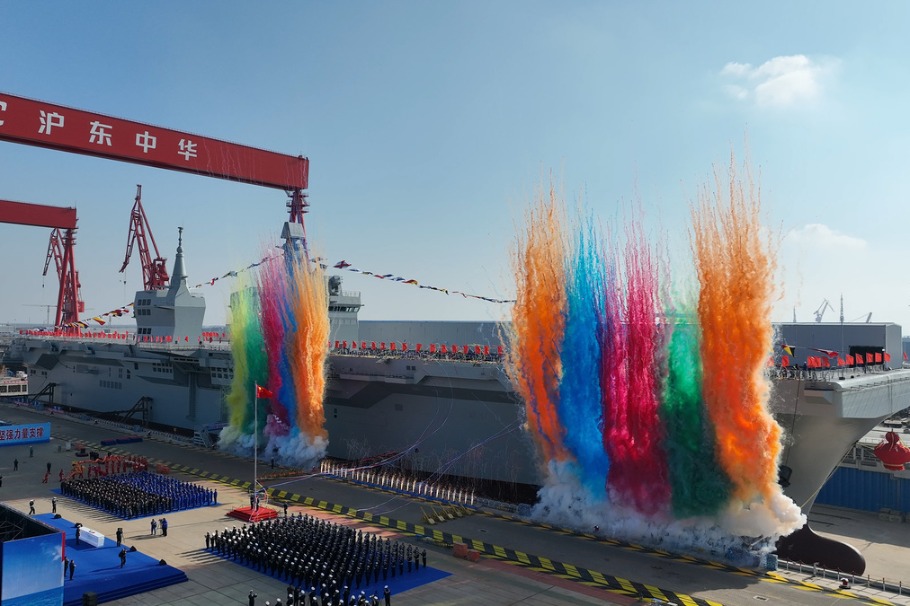Analyzing the illegality and invalidity of the South China Sea Arbitration Awards via six 'whys'
Keynote Speech at the Symposium on "South China Sea Arbitration Awards and International Law"

IV. Why is it erroneous for the arbitral tribunal to deny that China can claim rights over the Nansha Qundao as an entirety?
The arbitral tribunal's stance, which denies Nansha Qundao's qualification to claim territorial sovereignty and maritime rights, is fundamentally flawed for the following three reasons:
Firstly, from a legislative history perspective, the régime of continental States' outlying archipelagos was well established under customary international law prior to the conclusion of the Convention. This matter was not addressed in the Convention and continues to be governed by customary international law. During the Third United Nations Conference on the Law of the Sea, extensive debates took place regarding the regulation of continental States' outlying archipelagos, with different views on "single clauses" versus "different clauses." In 1974, nine continental countries, including Canada, Chile, Iceland, India, Indonesia, New Zealand, Mauritius, Mexico, and Norway, submitted a working paper advocating for the expansion of the archipelago system in the draft Convention to encompass continental States' outlying archipelagos. However, this proposal was not adopted. Later, in the 1975 "Informal Single Negotiating Text", a distinction was made between archipelagic States and continental States' outlying archipelagos, treating them as separate issues. The Text placed archipelagic States in section I and included in section II (Article 131) the provision: "The provisions of section 1 are without prejudice to the status of oceanic archipelagos forming an integral part of the territory of a continental State." However, this provision was omitted in the revised "Single Negotiating Text" of 1976. Subsequently, the draft Convention did not include provisions concerning continental States' outlying archipelagos until its adoption. Importantly, continental States solemnly declared, at the final stage of negotiations, that the legal status of their outlying archipelagos remained unaffected by the Convention.
Secondly, from an international practice perspective, numerous examples exist of continental countries claiming rights over the outlying archipelagos as a whole. Presently, approximately 20 continental countries worldwide possess outlying archipelagos, with 17 of them having established straight baselines for their outlying archipelagos as a whole. This widespread practice constitutes a common and consistent State practice, accompanied by corresponding opinio juris, sufficient to prove the existence of relevant customary international law. Moreover, the Convention itself supports the notion that continental countries can claim rights over entire outlying archipelagos. Firstly, Article 46 of the Convention defines "archipelago" without restricting it to archipelagic States, indicating its broader application in general international law. Secondly, Article 7 of the Convention allows for drawing straight baselines when "there is a fringe of islands along the coast in its immediate vicinity". The term "coast" in this provision lacks additional qualifications, suggesting the potential applicability of this provision to drawing straight baselines for the outlying archipelagos of continental countries.
Thirdly, in terms of China's practices, there is a substantial historical and legal basis for claiming rights over the Nansha Qundao in its entirety. China has consistently claimed and exercised territorial sovereignty and maritime rights over the Nanhai Zhudao, including Dongsha Qundao, Xisha Qundao, Zhongsha Qundao and Nansha Qundao, as a unified whole. Each Qundao's islands, rocks, low-tide elevations, and associated sea areas collectively constitute an integral entity. Determining the legal status of each Qundao, including its territorial sovereignty, maritime rights, and interests, should be based on the Qundao as a whole rather than on the status of individual islands, rocks, low-tide elevations, among others, that make up its components. China's holistic approach to the Nansha Qundao has a solid basis in international law. The Nansha Qundao, recognized as a "geographical, economic, and political entity," fully meets the criteria for the definition of an "archipelago" under the international law. Moreover, China's claims are supported by abundant domestic laws, including the 1958 "Declaration of the Government of the People's Republic of China on the Territorial Sea," the 1992 "Law on the Territorial Sea and Contiguous Zone," the 1998 "Exclusive Economic Zone and Continental Shelf Law," and the 1996 National People's Congress Standing Committee's "Decision on Ratifying the United Nations Convention on the Law of the Sea," which explicitly affirm China's claims of rights over the Nansha Qundao in its entirety. The arbitral tribunal erred fundamentally in dismembering the Nansha Qundao, individually adjudicating and disposing of various features therein, thereby misconstruing its legal status.


































